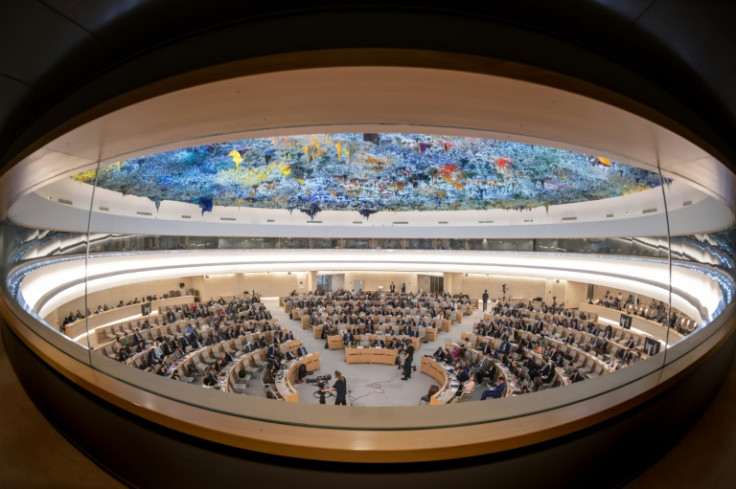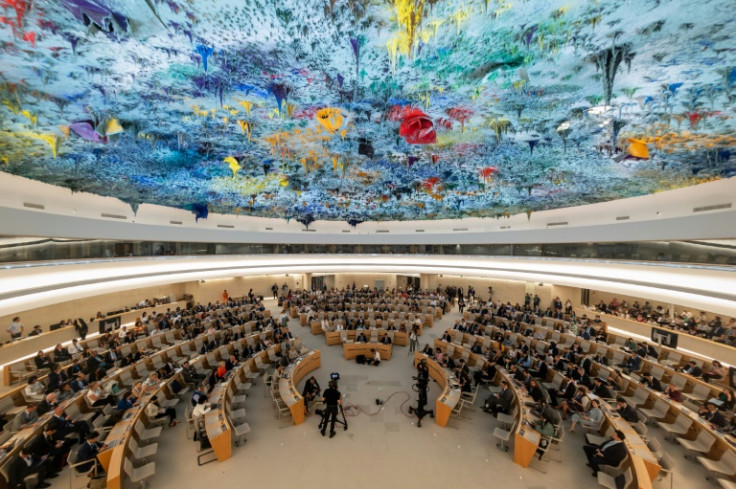UN Rights Council Condemns Koran Burnings Despite Splits

The UN Human Rights Council voted Wednesday to condemn recent Koran burning incidents, but many countries declined to back the resolution, fearing it encroached on free speech.
Despite overwhelming condemnation of the Muslim holy book being desecrated, the vote brought more division than unity, with countries from Europe and the Americas saying a bit more work could have resulted in a stronger, unanimous decision.
Pakistan and other Organisation of Islamic Cooperation countries brought forward a debate and resolution after an Iraqi refugee burnt pages from the Koran outside Stockholm's main mosque last month. The incident triggering a diplomatic backlash across the Muslim world.
The United Nations' top rights body backed the OIC resolution on countering religious hatred by 28 votes in favour, with 12 against and seven abstentions.
Despite the vote passing to applause, there were few cheerful notes sounded in the chamber.
Britain, the United States, European Union countries including France and Germany, plus Costa Rica and Montenegro, voted against the resolution.
US ambassador Michele Taylor said that with more time and discussion, a consensus could have been reached.
"Unfortunately our concerns were not taken seriously," she said.
"I'm truly heartbroken that this council was unable to speak with a unanimous voice today in condemning what we all agree are deplorable acts of anti-Muslim hatred, while also respecting freedom of expression."
And there was little sense of triumph from Pakistan's ambassador Khalil Hashmi, speaking for the OIC.
Hashmi insisted the resolution was not looking to curtail free speech, but had been aimed at striking a prudent balance.
"Regrettably, some states have chosen to abdicate their responsibility to prevent and counter the scourge of religious hatred," he said.
"A message has been sent to billions of people of faith across the world that their commitment to prevent religious hatred is merely a lip service.
"The opposition of a few in the room has emanated from their unwillingness to condemn the public desecration of the holy Koran.
"They lack political, legal and moral courage."
The wording of the resolution condemns all manifestations of religious hatred, including "public and premeditated acts of desecration of the Holy Koran", and underscores the need to hold those responsible to account.
It urges states to adopt laws to "address, prevent and prosecute acts and advocacy of religious hatred that constitute incitement to discrimination, hostility or violence".
It also wants the UN rights chief Volker Turk to identify gaps in countries' laws in light of the resolution.
Benin, Chile, Mexico, Nepal and Paraguay were among the abstentions.
Mexico's ambassador Francisca Mendez Escobar said: "Not all criticism of religion amounts in and of itself to an incitement to discrimination, hostility or violence."
Paraguay's ambassador Marcelo Scappini Ricciardi said that a resolution which all countries could back was "clearly possible".
"If we cannot agree on such an essential topic, that does not show us in a good light," he said.
Chile's ambassador Claudia Fuentes Julio added: "Some of its provisions would seek to limit freedom of expression.
"Chile deplores that the constructive suggestions made during the negotiations were not duly reflected in the text."
Argentina, China, Cuba, India, South Africa, Ukraine and Vietnam backed the resolution.
"Islamophobia is on the rise. Incidents involving desecrating the holy Koran have happened again and again in some countries," China's ambassador Chen Xu said.
"These countries have done nothing to implement their professed respect for the protection of freedom of religious belief."
Despite backing the resolution, Argentinian ambassador Federico Villegas admitted: "We would have liked to have reached a text with more consensus and clarity."

© Copyright AFP 2025. All rights reserved.





















